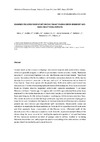Identificador persistente para citar o vincular este elemento:
https://accedacris.ulpgc.es/jspui/handle/10553/17956
| Título: | Evidence for long-term uplift on the Canary Islands from emergent Mio-Pliocene littoral deposits | Autores/as: | Meco, Joaquín Scaillet, Stéphane Guillou, Hervé Lomoschitz, Alejandro Carracedo, Juan Carlos Ballester Santos, Javier Betancort-Lozano, Juan Francisco Cilleros, Antonio |
Clasificación UNESCO: | 24 Ciencias de la vida 2416 Paleontología |
Palabras clave: | K-Ar Ages Sea-Level Changes Gran-Canaria Oceanic-Island Evolution, et al. |
Fecha de publicación: | 2007 | Publicación seriada: | Global and Planetary Change | Resumen: | Several islands in the Canarian archipelago show marine deposits with identical fossil faunas, which are generally assigned to different glacioeustatic marine episodes: mainly Pleistocene episodes in Lanzarote and Fuerteventura, and Mio-Pliocene ones in Gran Canaria. Three fossil species (Saccostrea chili, Nerita emiliana and Strombus coronatus) characterize all the marine deposits from southern Lanzarote, to the west and south of Fuerteventura and northeast of Gran Canaria. Three other species (Ancilla glandiformis, Rothpletzia rudista and Siderastraea miocenica) confirm the chronostratigraphic attribution of these deposits. Other more occasional fossils (as Chlamys latissima, Isognomon soldanii and Clypeaster aegyptiacus) fit an upper Miocene and lower Pliocene age. | URI: | https://accedacris.ulpgc.es/handle/10553/17956 | ISSN: | 0921-8181 | DOI: | 10.1016/j.gloplacha.2006.11.040 | Fuente: | Global and Planetary Change [ISSN 0921-8181], v. 57 (3-4), p. 222-234, (Junio 2007) |
| Colección: | Artículos |
Citas SCOPUSTM
48
actualizado el 08-jun-2025
Citas de WEB OF SCIENCETM
Citations
49
actualizado el 22-feb-2026
Visitas 5
395
actualizado el 15-ene-2026
Descargas
338
actualizado el 15-ene-2026
Google ScholarTM
Verifica
Altmetric
Comparte
Exporta metadatos
Los elementos en ULPGC accedaCRIS están protegidos por derechos de autor con todos los derechos reservados, a menos que se indique lo contrario.
